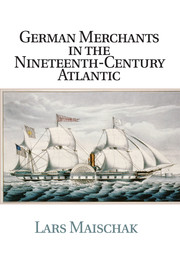
- Publisher:
- Cambridge University Press
- Online publication date:
- July 2013
- Print publication year:
- 2013
- Online ISBN:
- 9781139083645

This study brings to life the community of trans-Atlantic merchants who established strong economic, political and cultural ties between the United States and the city-republic of Bremen, Germany in the nineteenth century. Lars Maischak shows that the success of Bremen's merchants in helping make an industrial-capitalist world market created the conditions of their ultimate undoing: the new economy of industrial capitalism gave rise to democracy and the nation-state, undermining the political and economic power of this mercantile elite. Maischak argues that the experience of Bremen's merchants is representative of the transformation of the role of merchant capital in the first wave of globalization, with implications for our understanding of modern capitalism, in general.
Winner, 2013 Hans Rosenberg Prize, Central European History Society
‘Lars Maischak’s research on Hanseatic merchant capitalism and its transatlantic economic networks marks a signal achievement in Atlantic World scholarship. By integrating German Hanseatic networks into the Atlantic economy of antebellum America and northern Europe, Maischak throws light on a much-neglected component of nineteenth-century transnationalism. Alive to the cultural attitudes that shaped the business practices of merchant communities, Maischak deftly deploys numerous lenses to study how cosmopolitan conservative patrician traders, in abetting the rise of industrial world markets, brought about their own decline. This insightful and wide-ranging discussion elegantly restores the economic and sociopolitical world of merchant capitalists, whose compelling story runs counter to the dominant narratives of nation-states and industrialization. Well written and conceptually smart, this book speaks to numerous discussions in nineteenth-century studies.’
James M. Brophy - University of Delaware
‘Painstakingly tracing the transnational community of Hanseatic merchants living in Bremen, New York, and Baltimore, Lars Maischak recovers the global dimensions of the antebellum American economy. Deftly managing German and American sources and tracing German-American ties beyond the marketplace to the political and intellectual clubs and associations of New York and Baltimore, Maischak convincingly demonstrates that the origins of American industrial capitalism in the nineteenth century depended on institutions and practices developed in a transnational context. In the process he explains how this community of elite merchants helped transform an Atlantic marketplace into a global one.’
Christian J. Koot - Towson University
‘Lars Maischak’s study of the merchants of Bremen in Germany and North America is an excellent work of nineteenth-century history. Deeply researched and elegantly argued, the book’s trans-Atlantic perspective offers intriguing insights into a wide variety of topics: from the gendered administration of family property to the doctrines and practice of nineteenth-century conservatism, and from a consideration of the supporters and opponents of nationalism to an analysis of the financial and economic transition from mercantile to industrial capitalism.’
Jonathan Sperber - University of Missouri
'… a detailed exposé … [Maischak's] work significantly pushes scholars of the antebellum United States and of circa-1848 Germany to extend their narratives.'
Kristin L. Condotta Source: H-Soz-u-Kult
 Loading metrics...
Loading metrics...
* Views captured on Cambridge Core between #date#. This data will be updated every 24 hours.
Usage data cannot currently be displayed.